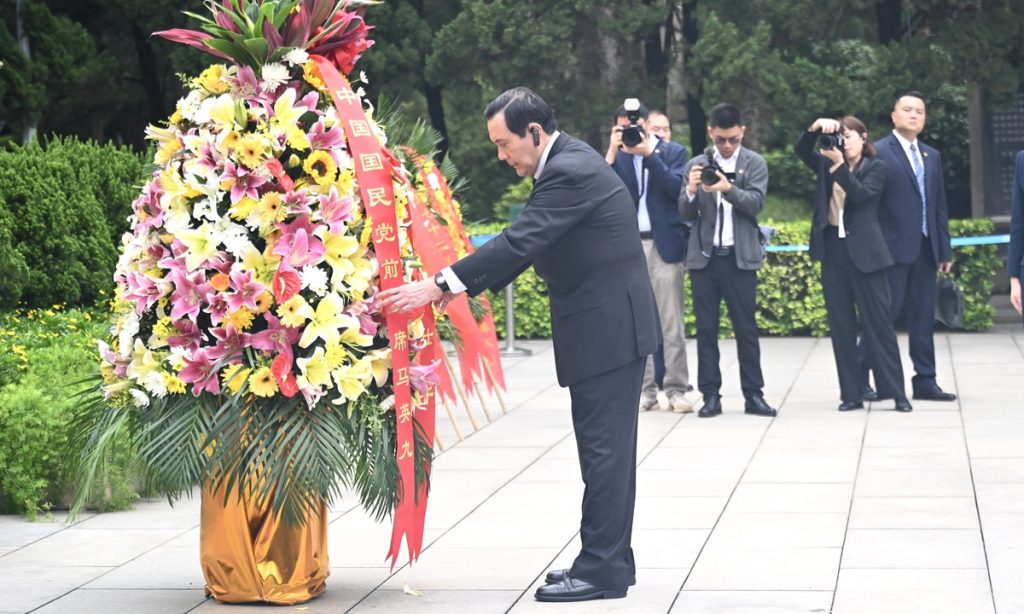Taiwan youths, inspired by Ma Ying-jeou's mainland trip, stress common roots and co-development

"On both sides of the Taiwan Straits, we share the same roots. It's important we don't forget about that amid distractions," Taiwan youths said on Saturday as former chairperson of the Kuomintang (KMT) Party Ma Ying-jeou is paying a visit to the Chinese mainland for a second consecutive year, which according to analysts, suggests an elevation from tracing personal roots to the collective ancestors.
On Saturday, Ma led a delegation of young people from Taiwan to visit the world-renowned iconic Terracotta Warriors in Xi'an, Northwest China's Shaanxi Province, where he expressed keen interest not only in the evolution of weapons, but also the shape of different arms.
Discovered in 1974, the army of Terracotta Warriors was built by Emperor Qinshihuang of the Qin Dynasty (221 BC-207 BC), who unified China for the first time.
Upon China's Tomb-Sweeping Day, or Qingming Festival, the former KMT leader on Thursday participated in a public worship ceremony of China's legendary ancestor Huangdi, or the Yellow Emperor. While on Friday, he paid tribute at the home of his ancestors, the Ma Yuan Temple, to commemorate the patriotic spirit of his ancestor Ma Yuan, who gave his life for the country.
Taiwan compatriots studying and working in the Chinese mainland, especially the younger generations, are paying close attention to Ma's destination choices for his mainland trip.
Lee Wei-kuo, chairman of the Taipei-based Chinese Youth Trade Development Association, told the Global Times on Saturday that by participating in the Qingming Festival traditions and worshiping the ancestors, Ma conveyed a clear message that people from both sides of the Taiwan Straits are all descendants of the same bloodline, and share the same roots and culture.
KMT has had a tradition of honoring the Yellow Emperor during the early days. However, today, the Democratic Progressive Party (DPP) authorities in the island stopped this tradition due to their promotion of ''Taiwan independence,'' Wang Jianmin, a senior cross-Straits expert at Minnan Normal University in Fujian, told the Global Times on Saturday.
Political figures within the KMT like Ma, who has a strong sense of Chinese nationalism, have always emphasized the inheritance of Chinese culture and the confidence of the Chinese nation, thus placing great importance on ancestral worship, Wang said.
Ma's participation in the activities of Qingming Festival this time holds significant meaning for Taiwan regional society, and the youth community, boosting the mutual understanding of history and traditions between the two sides, Wang noted.
From Ma's family ancestral worship visit to the mainland last year to this year's worship of the common ancestors of the Chinese people, there has been a transition and elevation from the personal to the collective, analysts stressed.
If last year's visit was an ice-breaking trip, this year's visit is a peaceful journey made against the backdrop of tense cross-Straits relations, Wang said.
Besides the birthplaces of Chinese culture, Ma and the delegation also visited Shenzhen in South China's Guangdong Province, with a focus on witnessing mainland's technological advancement. This includes a number of high-tech enterprises, including Chinese leading drone manufacturer DJI, technology conglomerate Tencent and new energy vehicle giant BYD.
Lee, who is also head of Sichuan Welove Technology Development Co, believes that the Shenzhen leg of the trip will allow more Taiwan youths to witness the tremendous changes in mainland's development and the achievements of reform and opening-up, thus encouraging more people-to-people exchanges.
Ma's trip conveys these Taiwan youths' direct and emotional understanding of the mainland and their knowledge of Chinese history to more people in the island, Wang noted.
From Sunday, the delegation is scheduled to visit the political, economic and cultural center - Beijing.
According to Wang, it is expected that Ma and his delegation will express their hopes for the development of cross-Straits relations and the openness of cooperation and exchanges between the two sides, which can play a positive role in easing the tension under the current complex and severe situation.
However, Ma's visit to the mainland cannot fundamentally change the current difficulties in cross-Straits relations, analysts stressed. "We need to have an objective understanding of the development of cross-Straits relations. This requires long-term efforts from all sectors," Wang said.
The timing of Ma's visit to the mainland coincided with Chair of the American Institute in Taiwan Laura Rosenberger's Taiwan visit, but the two trips are expected to have the opposite effect. Also, while Ma kicked off his trip to the mainland, the DPP engaged in provocative actions, including fire drills in Kinmen.